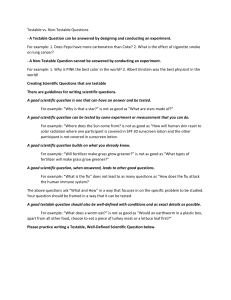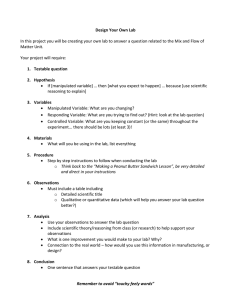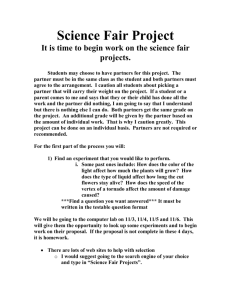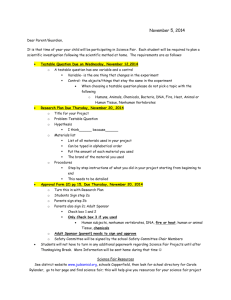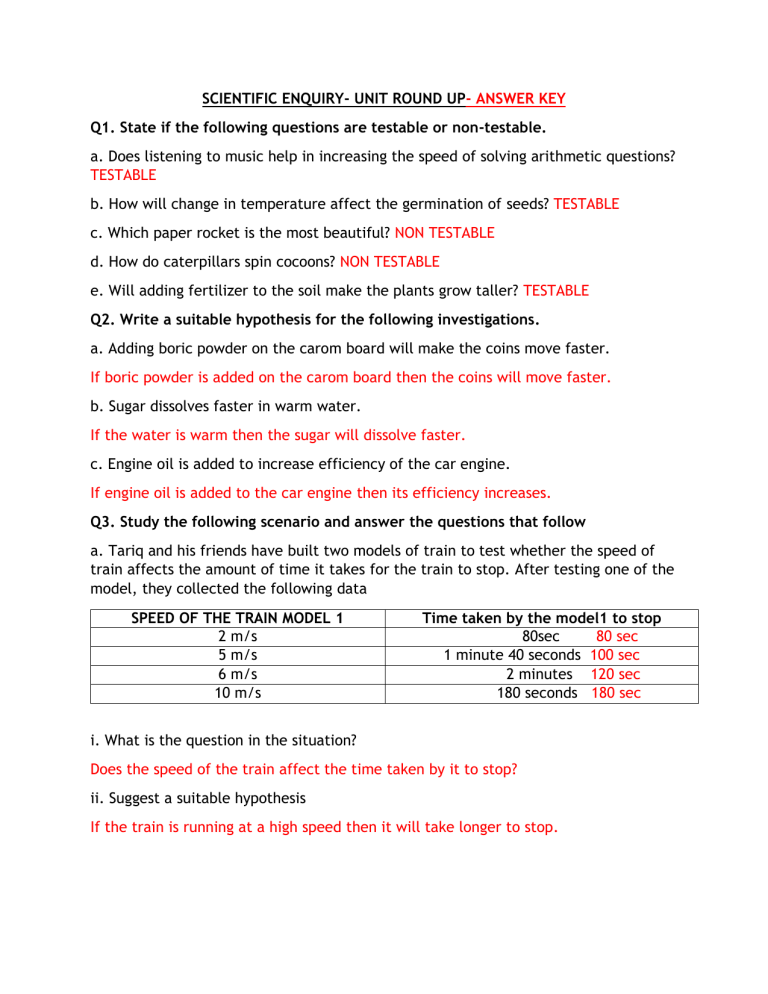
SCIENTIFIC ENQUIRY- UNIT ROUND UP- ANSWER KEY Q1. State if the following questions are testable or non-testable. a. Does listening to music help in increasing the speed of solving arithmetic questions? TESTABLE b. How will change in temperature affect the germination of seeds? TESTABLE c. Which paper rocket is the most beautiful? NON TESTABLE d. How do caterpillars spin cocoons? NON TESTABLE e. Will adding fertilizer to the soil make the plants grow taller? TESTABLE Q2. Write a suitable hypothesis for the following investigations. a. Adding boric powder on the carom board will make the coins move faster. If boric powder is added on the carom board then the coins will move faster. b. Sugar dissolves faster in warm water. If the water is warm then the sugar will dissolve faster. c. Engine oil is added to increase efficiency of the car engine. If engine oil is added to the car engine then its efficiency increases. Q3. Study the following scenario and answer the questions that follow a. Tariq and his friends have built two models of train to test whether the speed of train affects the amount of time it takes for the train to stop. After testing one of the model, they collected the following data SPEED OF THE TRAIN MODEL 1 2 m/s 5 m/s 6 m/s 10 m/s Time taken by the model1 to stop 80sec 80 sec 1 minute 40 seconds 100 sec 2 minutes 120 sec 180 seconds 180 sec i. What is the question in the situation? Does the speed of the train affect the time taken by it to stop? ii. Suggest a suitable hypothesis If the train is running at a high speed then it will take longer to stop. iii. Identify the independent variable, dependent variable and controls in the experiment. Independent variable - speed of the train Dependent variable – time taken by the train to stop Controls- size of the train/ material of the train, material of the track/ stop watch to measure time iv.In your opinion which train model will be the control group and which one will be the experimental group? Support your opinion with a valid reason. Suggested opinion- Train model 1 is the experimental group as it is tested at different Train Model 2 is the control group, as its speed is not changed. v. Write the procedure that they can follow to test their model. 1. Gather materials like- (suggested list of materials) 300 LEGO blocks (if the train design is to be built with LEGO blocks) OR 10 pieces of wood size10 cms each (if the train design is to be built with wood) OR 2 cardboards 10 plastic caps of the same size, straws or rubber bands to join the coaches (if the train design is to be built with cardboard and recyclable materials), 2 motors, 2 AA size battery, 2 tracks to run the train, stop watch to measure the time taken 2. Design 2 similar models for trains. 3. Label one of the model as C-control group and the other one as E- experimental group 4. Attach motor to both the models. 5. Run the train labeled C on the track and record the time taken by it to stop. 6. Run the train labeled E on the track at different speeds and record the time taken in each trial. 7. Observe and collect data. vi. How can they make it a fair test for reliable testing? They can make it a fair test by changing only one variable and maintaining all the other factors same. Also by setting up a control and experimental group to compare results helps in reliable testing. Further, performing 2-3 trails can strengthen the fair testing procedure. vii. Represent the data as a bar graph (for representing on graph, data should be recorded in same units) 200 Time taken to stop model train at different speeds Title of the graph 180 180 time taken to stop (seconds) Label of vertical axis 160 140 120 120 100 100 80 80 60 40 20 0 Speed of the train Model 1 ( m/s) Label of horizontal axis 2m/s 5m/s 6m/s 10m/s viii. What conclusion can be drawn from the data provided? Train at a higher speed takes longer time to stop.

